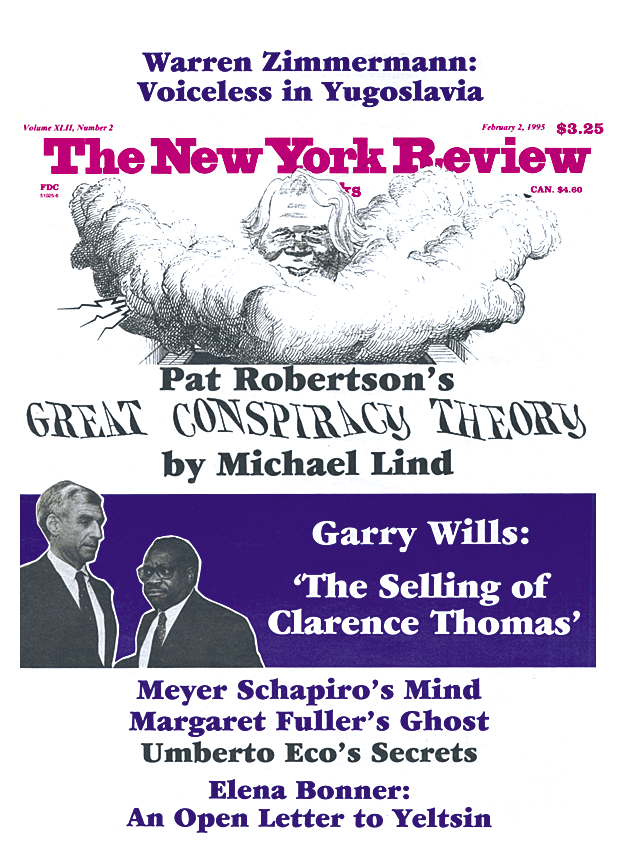Moscow
December 28, 1994
No idea, even an idea as close to the hearts of many Russians as the indivisibility of Russia, can justify a war against a whole people. A democratic country cannot keep a nation in thrall by military force. The Russian-Chechen war is a clear demarcation, the turning of Russia back to totalitarianism. There is no truth in your statements that the Russian army on Chechen soil is defending only the country’s territorial integrity and restoring constitutional order. Russian soldiers are defending above all the interests of the military-industrial complex that has devoured Russia for decades, the army brass that is married to it, and our domestic oil magnates—the interests of those for whom blood is cheaper than oil. This mafia today has taken charge of the state, and you have been outwitted. But while you are still formally the President of Russia, you—the Commander-in-Chief—are still responsible for the fact that soldiers carrying out a criminal order are murdering Chechens and being killed themselves in the fire of a fratricidal war.
Did you hear the NTV broadcast on December 28? I will personally repeat it for you: 2,000 Chechens killed, of whom 340 were Chechen fighters, and the rest women, children, and old men; 824 Russian soldiers killed, with 1,000 tanks surrounding the city. This is like a Battle of Stalingrad launched by the new masters of Russia, and at a time when you announced to the whole world that there would be no storming of Grozny!
For months, a mendacious, anti-Chechen campaign has been waged on state television which has managed to fool almost the whole country. Don’t you care who’s paying for this campaign? Ask those who planted the idea with you about the “tens of thousands of mercenaries from the Baltic countries and Azerbaijan.” Think hard: Won’t your words become a prelude to the next push to the west and to the south1 after Grozny?
The murder of the journalist Dmitry Kholodov2 and the compliments you paid to Defense Minister Grachev which immediately followed it, and the games your security detail played around the Moscow mayor’s office,3 were a prologue to the war. The storming of Grozny is not the end of it, but only the beginning. What next? Gag the press, harass the inconvenient, dig up or manufacture compromising material on them, intimidate them, and jail them? The FSK4 has already demonstrated that it has retained its old habits. Put an end to all reforms—political or economic? Under the pretext of reconstructing Chechnya and increased spending on the army, the country will be further ruined and its real masters will grow rich.
In August 1991, Russia, together with you, did not let these people come to power. Today, with your help (whether willing or not, only history will judge) they have conquered Russia and you. You have met your Foros!5
You have announced the formation of a new presidential commission charged with monitoring human rights in Chechnya. Wake up! We have already had something like this in our history. At the end of the 1970s, almost all the members of the independent Moscow Helsinki Group (I had the honor to be a member) and the members of analogous groups in the Soviet Union’s republics were sent to the gulag or exile. Later another group was hastily formed under a similar name. The infamous Fyodor Burlatsky6 was chosen to head this creature of the KGB and the Politburo. (However this commission fooled very few people in the world.) Don’t count on fooling them now, when the Chairman of the Presidential Commission on Human Rights, Sergei Kovalyov, parliamentary deputies Mikhail Molostvov, Valery Borshchov, and Leonid Petrovsky, as well as the expert of the Memorial Society, Oleg Orlov, are in Grozny. There they are defending human rights with truthful information about massive violations, sharing the tragic fate of the Chechen people under bombs and shells.
I am in complete solidarity with their position, and since I no longer consider it possible to cooperate with your administration in any form, I announce my resignation from the President’s Commission on Human Rights.
Elena Bonner
—translated by
Catherine A. Fitzpatrick
This Issue
February 2, 1995
-
1
The title of Vladimir Zhirinovsky’s book is The Last Push to the South—translator’s note. ↩
-
2
Kholodov was a reporter for Moskovskiy komsomolets who had covered corruption in the army. In October 1994 he received a phone tip to pick up a briefcase allegedly containing further confirmation of his story, and was killed when the bomb inside exploded in his office. High-ranking army officers were accused by many of having arranged Kholodov’s murder—translator’s note. ↩
-
3
In December 1994, unidentified paramilitary forces attacked, disarmed, and arrested guards at the office of Vladimir Gusinsky, president of the Most Group, a bank and investment service with media interests, including NTV. The attackers were subsequently identified as members of the President’s personal guard, and the show of force was believed to be a threat to NTV’s critical coverage of the President. The Most offices are in the same building as the mayor’s office—translator’s note. ↩
-
4
The Russian acronym of Federal’naya sluzhba kontrrazvedki, the federal counterintelligence service, or successor to the KGB—translator’s note. ↩
-
5
Foros is the resort town on the Black Sea in the Crimea where Gorbachev was held under house arrest during the August 1991 coup—translator’s note. ↩
-
6
Burlatsky, one of Khrushchev’s speech-writers, was a prominent perestroika-era liberal who in December 1987 was made head of the Public Commission for International Cooperation on Humanitarian Issues and Human Rights in a government-sponsored effort to distract Western attention from the newly revived Moscow Helsinki Group, which was struggling to attract attention to continuing human rights abuse—translator’s note. ↩


